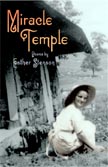|
|
In "Amish aunt’s poetic voice," her review of Miracle Temple in Mennonite Weekly Review, Melanie Springer Mock observes that "Poetry books sometimes struggle to find wider audiences, maybe because reading poetry is assumed too difficult, the meaning in poems too buried, the conventions too arcane. Still, Miracle Temple — both the poems in Aunt Amelia’s voice, as well as the works appearing later in Stenson’s collection — are accessible even to those most intimidated by poetic convention. Readers willing to step into Stenson’s poems will be rewarded, both by Aunt Amelia’s remarkable stories and by Stenson’s poetic worldview — a worldview with which Anabaptists will no doubt resonate." Summary: Here are
poems able to draw both tears and laughter, as they express unrepressed
spirit in two different yet authentic voices—one Aunt Amelia as
channeled by her niece Esther, the other that of Stenson
herself. See also more DreamSeeker Poetry Series titles. Comment: "Stenson’s structure opens up these poems, allowing Amelia's voice to be sustained and her story to come through clearly, yet Stenson’s own voice and perspective establish themselves in the second part of the book. A beautiful and worthwhile book." —Jeff Gundy "What a fascinating read this is. Three-quarters of the book, truly a documentary triumph, captures the voice of Aunt Amelia, tracing her seeker’s journey from a Pennsylvania Amish farm to the Miracle Temple in Los Angeles. Transformation, change, resiliency, and self-creation continue to propel the final fourth, spoken by Amelia’s niece, herself a seeker and traveler from a plain community. These poems celebrate Spirit and gracefully yet completely explode all plain-woman stereotypes, then finally come to rest—if there is rest in such a lively collection—in celebration of our shared, sacred earth. I am so thankful for this rich and reckless honesty!— Julia Spicher Kasdorf, The Body and the Book: Writing from a Mennonite Life "Traditional perimeters of place, community, and identity are shaken open in Miracle Temple. From the smoldering ash of an Amish house fire in Pennsylvania to mountain snow reflected in Black Dragon pool in Lijianng, China, these poems are infused with wanderlust, curiosity, and resilient spirit. Stenson crafts the frank, unsentimental details of life experience into poems that are biblical, ecological, elegiac, and redemptive. With Aunt Amelia's spark and spunk, and Stenson's marvelous capacity as listener and tender of stories, what reader won't welcome these peace pilgrims into their hearts and homes?"— Laurie Kutchins, The Night Path and Slope of the Child Everlasting: Poems Market: Stenson’s poetry should appeal to general readers and especially those drawn to a poet able to celebrate life both in Amish and Mennonite-related communities as well as in the larger world. Shelving: Poetry; Anabaptist-Mennonite literature. BISAC: Poetry; RTM: 640 Poetry. The Author: The life journey of Esther Yoder Stenson, Harrisonburg, Virginia, extends from an Amish home in Virginia to El Salvador, China, and back to Harrisonburg, Virginia. Currently she teaches literature and composition at James Madison University. Publisher: Cascadia
Publishing House |
|||||||





